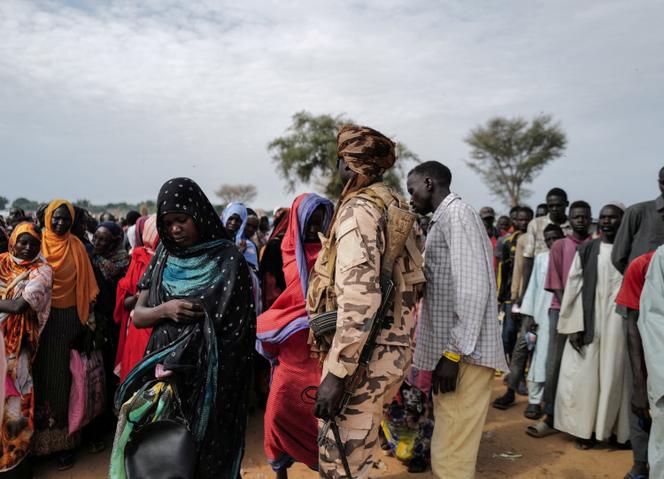


An apocalyptic atmosphere reigns on the border between Chad and Sudan. Under stormy skies, endless columns of refugees walk across the thin cordon separating the two countries. Their sandals sink into the soggy ground under the watchful eye of the Chadian army. Since April 15 and the start of the war pitting the Sudanese army, led by General Abdel Fattah al-Burhan, against the Rapid Support Forces (RSF) militia of General Mohamed Hamdan Dagalo, known as "Hemeti," Chad has left a humanitarian corridor open. Only luggage is searched.
"Up to 2,000 people arrive every day to escape the atrocities of war," explained Colonel Ali Mahamat Sebey. On July 10, the prefect of the Assoungha department worriedly scanned the last checkpoint held by the Rapid Support Forces (RSF), less than 400 meters away. The war was so close that we could hear a few explosions, sometimes the whistle of a bullet.
"I ran 30 kilometers carrying the body of my 2-year-old son to bury him here. As we fled, we came across vehicles of armed men firing at us. People were falling. We couldn't count the dead and wounded," said Anane Kamis Ahmat, draped in a flower-patterned garment, before boarding a United Nations High Commissioner for Refugees (UNHCR) truck that would carry her away from the horror.
"They mercilessly slaughtered women, children, the elderly and even cattle – no one was spared. From El Geneina to here, I saw bodies everywhere on the road. It was Hemeti's men who did it, and also the Arab militias who are their allies. They machine-gunned defenseless civilians who wanted to escape," explained a young mother, Nadia Ahmat Abdraman, clutching her infant in her arms.
Like the vast majority of refugees arriving in Chad, these two women fled El Geneina, the capital of West Darfur. While the Sudanese army concentrated its efforts on Khartoum, the RSF, supported by Arab militias, launched a "war within a war" in western Sudan, as local aid workers put it. Since then, the conflict with the Massalit self-defense groups has once again taken the form of ethnic massacres.
"They target Black people. They target the Massalit in particular and those with dark complexions in general. They spare the light-skinned Arabs. They want to wipe out the Black ethnic groups – that's been their objective since 2003. They decided to finish what they started," said Hissein Sahat Ahmat, a refugee, as tears welled up in his eyes. The self-defense groups of the Massalit, the majority non-Arab ethnic group in this region, previously took up arms against Omar Al-Bashir's government in 2003. Some 300,000 deaths later, according to the United Nations, and accusations of "genocide" by the United States, most experts agree that the scenario is repeating itself in Darfur.
You have 71.45% of this article left to read. The rest is for subscribers only.
